Knock Sensor -- Installation |
| 1. INSTALL KNOCK SENSOR |
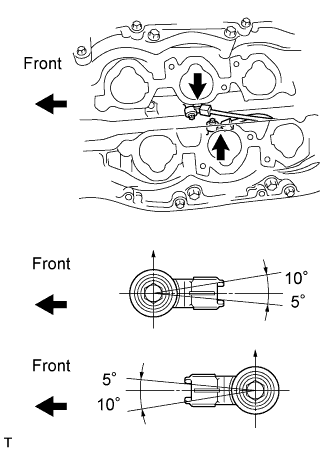 |
Install the 2 knock sensors so that they are horizontal as shown in the illustration. Then install the 2 bolts.
- Torque:
- 20 N*m{204 kgf*cm, 15 ft.*lbf}
- HINT:
- It is acceptable for the sensor to be tilted +10° to -5°.
Connect the 2 sensor connectors.
| 2. INSTALL INTAKE MANIFOLD |
Set a new gasket on each cylinder head.
- NOTICE:
- Align the port holes of the gasket and cylinder head.
- Be careful of the installation direction.
Set the intake manifold on the cylinder heads.
Install and tighten the 6 bolts and 4 nuts uniformly in several steps.
- Torque:
- 21 N*m{214 kgf*cm, 15 ft.*lbf}
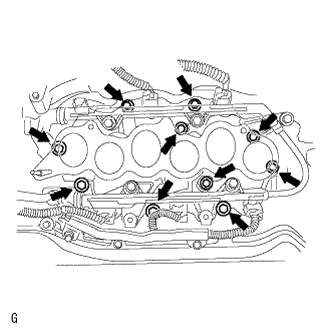 |
Install the fuel hose with the bolt.
- Torque:
- 10 N*m{102 kgf*cm, 7 ft.*lbf}
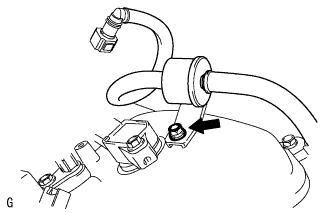 |
| 3. INSTALL INTAKE AIR SURGE TANK |
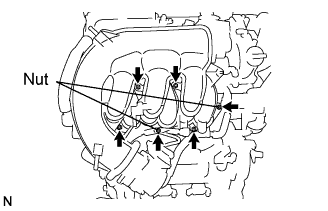 |
Install a new gasket to the intake air surge tank.
Install the intake air surge tank with the 2 nuts.
- Torque:
- 16 N*m{163 kgf*cm, 12 ft.*lbf}
Using a 5 mm hexagon socket wrench, install the 4 bolts.
- Torque:
- 18 N*m{184 kgf*cm, 13 ft.*lbf}
Install the 2 surge tank stays with the 4 bolts.
- Torque:
- 21 N*m{214 kgf*cm, 15 ft.*lbf}
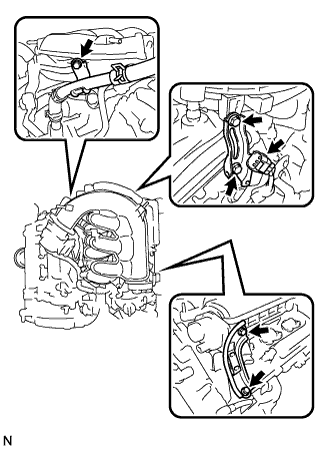 |
For Chinese specification:
Connect the water hose joint with the bolt.- Torque:
- 10 N*m{102 kgf*cm, 7 ft.*lbf}
For except Chinese specification:
Connect the water by-pass pipe with the bolt.- Torque:
- 10 N*m{102 kgf*cm, 7 ft.*lbf}
Install the 3 wire harness clamps.
Connect the IACV connector.
Connect the throttle motor connector.
| 4. CONNECT FUEL MAIN TUBE |
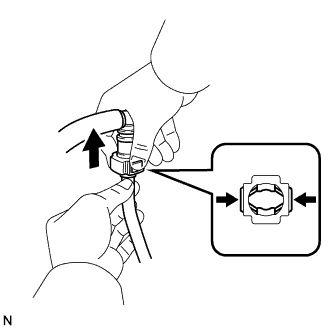 |
- NOTICE:
- Before installing the fuel hose's connectors to the fuel pipe, check the connector for damage and foreign matter.
Connect the connector to the fuel main pipe. Push the two parts together firmly until a "click" sound is heard. Then attach the lock claws to the connector by pushing down on the connector cover.
Check that the connector and fuel main pipe are securely connected by trying to pull them apart.
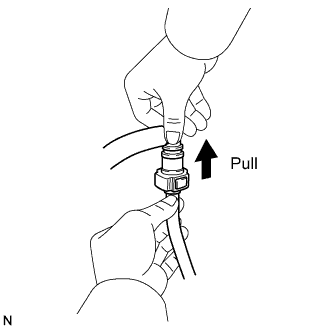 |
Install the fuel pipe clamp.
 |
| 5. CONNECT NO. 1 VENTILATION HOSE |
Connect the ventilation hose to the ventilation valve.
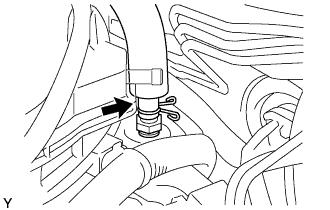 |
| 6. CONNECT UNION TO CHECK VALVE HOSE |
Connect the hose to the surge tank.
| 7. CONNECT WATER BY-PASS HOSE |
Connect the 2 water by-pass hoses to the throttle body.
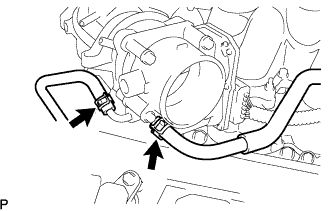 |
| 8. INSTALL AIR CLEANER CAP WITH AIR CLEANER HOSE |
Install the air cleaner cap with air cleaner hose with the 4 clamps and hose clamp.
- HINT:
- Be sure to install the air cleaner assembly so that the screw part of the hose clamp is as shown in the illustration.
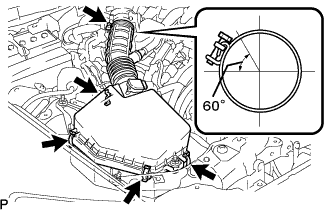 |
Install the VSV (for EVAP) to the air cleaner hose.
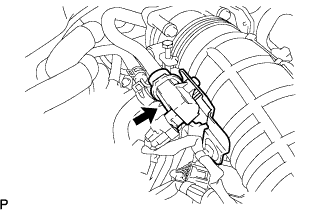 |
Connect the MAF meter connector and clamp to the air cleaner.
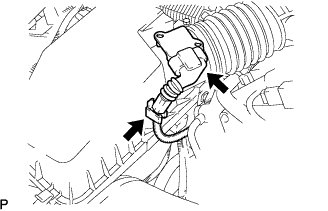 |
| 9. CONNECT NO. 2 VENTILATION HOSE |
Connect the ventilation hose to the cylinder head cover with the clamp.
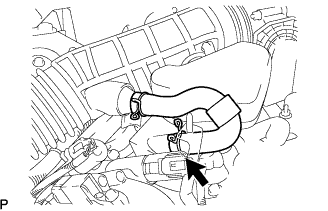 |
| 10. CONNECT CABLE TO NEGATIVE BATTERY TERMINAL |
| 11. ADD ENGINE COOLANT |
Tighten all the plugs and fill the radiator with TOYOTA Super Long Life Coolant (SLLC).
- Torque:
- 12.7 N*m{130 kgf*cm, 9 ft.*lbf} for cylinder block drain cock plug
Add engine coolant.
- Specified capacity:
- 9.1 liters (9.6 US qts, 8.0 lmp. qts)
- HINT:
- TOYOTA vehicles are filled with TOYOTA SLLC at the factory. In order to avoid damage to the engine cooling system and other technical problems, only use TOYOTA SLLC or similar high quality ethylene glycol based non-silicate, non-amine, non-nitrite, non-borate coolant with long-life hybrid organic acid technology (coolant with long-life hybrid organic acid technology consists of a combination of low phosphates and organic acids).
- Please contact your TOYOTA dealer for further details.
Slowly pour coolant into the radiator reservoir until it reaches the FULL line.
Press the inlet and outlet radiator hoses several times by hand, and then check the level of the coolant.
If the coolant level is low, add coolant.
Install the radiator cap and reservoir cap.
Bleed air from the cooling system.
Warm up the engine until the thermostat opens. While the thermostat is open, circulate the coolant for several minutes.
- HINT:
- Adjust the air conditioner set temperature to MAX (HOT).
Maintain the engine speed at 2,000 to 2,500 rpm.
Press the inlet and outlet radiator hoses several times by hand to bleed air.
- NOTICE:
- When pressing the radiator hoses:
- Wear protective gloves.
- Be careful as the radiator hoses are hot.
- Keep your hands away from the radiator fan.
Stop the engine, and wait until the engine coolant cools down to ambient temperature.
- CAUTION:
- Do not remove the radiator cap while the engine and radiator are still hot. Pressurized, hot engine coolant and steam may be released and cause serious burns.
Check the coolant level in the radiator reservoir.
If the coolant level is low, add SLLC to the radiator reservoir FULL line.
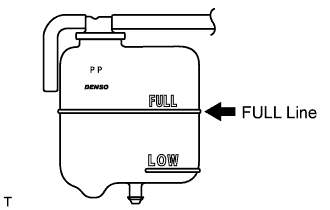 |
| 12. CHECK FOR ENGINE COOLANT LEAKAGE |
Check for engine coolant leaks (Click here).
| 13. CHECK FOR FUEL LEAKAGE |
Start the engine, and check that there are no fuel leaks after performing maintenance anywhere on the system.
| 14. CHECK FOR ENGINE OIL LEAKS |
Start the engine, and check that there are no oil leaks after performing maintenance.
| 15. INSTALL V-BANK COVER |
Install the V-bank cover with the 2 nuts.
- Torque:
- 5.0 N*m{51 kgf*cm, 44 in.*lbf}
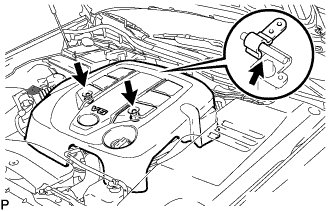 |
| 16. INSTALL ENGINE ROOM SIDE COVER RH |
Install the side cover with the 2 clips and nut.
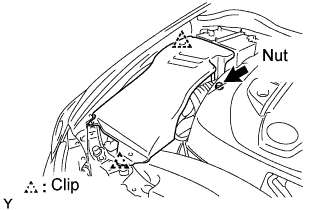 |
| 17. REMOVE COOL AIR INTAKE DUCT SEAL |
Install the intake duct seal with the 7 clips.
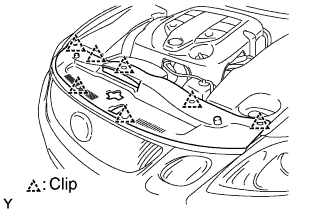 |
| 18. REMOVE ENGINE UNDER COVER |
Install the under cover with the 10 bolts and 3 clips.
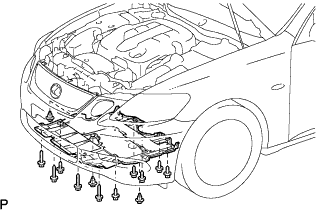 |
| 19. PERFORM INITIALIZATION |
Perform initialization (Click here).
- NOTICE:
- Certain systems need to be initialized after disconnecting and reconnecting the cable from the negative (-) battery terminal.
| 20. WARM UP ENGINE |
After the engine is warmed up, check that the installed parts operate normally.